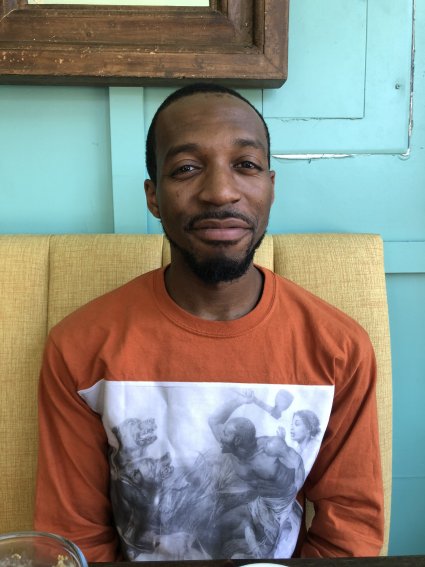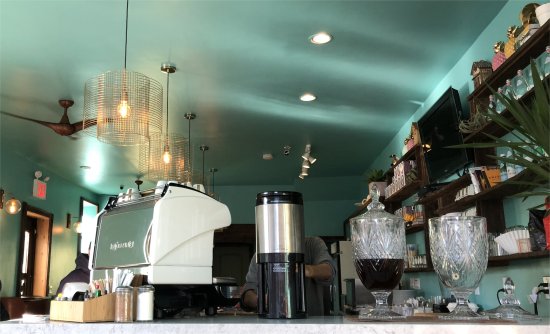NEW YORK CITY
October 30, 2018
STRANGER: Alex English
LOCATION: Cafe on Ralph, 86 Ralph Avenue, Brooklyn, New York City
THEME: Chatting with a standup comedian, writer and actor
Comedian Alex English went from watching Black Entertainment Television in his childhood to writing for BET as an adult, yet ask his family and they’ll say his career is a revelation.
“I never made my mother laugh a day in her life until I became a damn comic,” says Alex, a youthful 29-year old gay black comedian who performed his first standup on an inebriated whim.
He’s now a successful standup comedian and television writer for comedy shows, but in his childhood he lived in a speak-when-spoken-to home. Growing up in Detroit, Alex didn’t crack one-liners or joke around to amuse his family. But he did get exposure to a wide range of humor thanks to television. His mother loved white comedies like Seinfeld and Friends, whereas when Alex had the remote he’d tune into BET watching shows like ComicView and “just black ass comics.”
“So I got both styles of humor in my system early,” he says. Sitting across from me for breakfast, he flashes a smile and adds, “So I take that and run with it, and I can be my fullest self.”

“And I think she’d appreciate me making that kind of joke, my grandmother was not the type to hold her tongue,” Alex says, describing his act as the “perfect blend” of his mother and grandmother. “So it’s a healthy balance, even if all my family members are just ridiculous people.”
With an easygoing, charming stage persona he keeps audiences amused talking about his family, sexuality, finances, race and more. His style of humor results in sketches like the gag he tells about an unexpected guest from a hookup on the gay social app Grindr.
Our breakfast interview is taking place at Cafe on Ralph in Brooklyn, a short walk from where Alex lives. “This is one of those places I knew I’d end up there at one point,” he says.
An unassuming all-white exterior with floor-to-ceiling windows leads to the small bar and dining area inside, with bright turquoise walls and lemon-colored cushioned benches. The colors create a soothing atmosphere with a gentle assist from the seemingly random mix of jazz and pop songs playing in the background. It’s quiet enough that Alex and I are able to chat with ease.
I’m curious to learn how he evolved from a kid who didn’t make wisecracks, growing up in what he calls a very religious family, into a self-deprecating yet self-assured funny man.
“I was literally my only best friend” growing up, he says, because his mother moved around a lot throughout Michigan. He was initially born and raised in Detroit, which he calls “very, very black — let me take one of those verys back because of gentrification. But the people who live there stay there, unless you are my age and you want to get the hell out.”

It’s around that time he also had his first experience with racism, after a white girl friend’s mother wouldn’t let Alex and another black child use the friend’s swimming pool. “Kids are not racist, but I remember that friendship ending very quickly,” he says.
It was just one of several changes Alex was grappling with, including starting to get crushes on boys at school (though his first kiss was with a black tomboy in third grade). And although he didn’t tell jokes till he was an adult in New York, he wasn’t shy about clowning. He recalls a school bus ride and hearing a group of girls obsessing over the band B2K. “I shouted out, ‘Nah, they B2Gay,’ because everything’s gay to an eight grader. I laughed along with those jokes but way too hard for someone this feminine. And the girls dragged me, they said ‘Who you to talk?’”
Alex shrugs. “I’ve been dragged my whole life, I don’t learn my lesson. I just run my mouth consistently, but that’s the kind of kid I was in middle school.”

When it came time to apply to colleges, his mother tried to encourage him into studying illustration at Northwestern University in Illinois, because Alex used to draw a lot. But that didn’t interest him. He’d heard his mother saying she’d wanted to be a journalist, and that piqued his interest. So he settled on a journalism major at Central Michigan University. It started with a focus on broadcasting, but when he found out it involved dreaded math classes he switched the focus to print journalism. The switch cost him an extra year, so it took him five years to graduate.
The degree included a focus on English communications, and Alex remembers having to give speeches for class. “I would always incorporate something funny,” he recalls. His tutor praised his public speaking and way with words, and encouraged him to keep up with it.
After graduation he returned to Detroit, living with his mother and stepfather in cramped quarters that led to a lot of arguments. It also felt like a step back. “Things were exactly as when I had left Detroit,” Alex says. So he started to think about his next move.
i’m sure black gay men from detroit’s life expectancy is low, so instead of “happy birthday,” y’all should be telling me “congratulations!”
— alex english (@alex3nglish) December 16, 2016
In 2012 he got the opportunity to visit a family friend in New York for what was meant to be a week-long visit. “Nobody had a single clue I was plotting for that week to turn into staying there.” To raise funds for his secret move he sold his car, laptop, and even some prized tickets to an upcoming Frank Ocean concert. He bought a one-way Greyhound bus ticket, planning to keep aside enough funds for the return leg if the transition to the Big Apple didn’t work out.
Once in the city, he found a place to print up his CV, using resume-polishing skills he’d learned in his college communications classes and “making up shit to look good” about his non-existent work experience. After handing out dozens of resumes, he found employment at a coffee shop. He remembers wanting to stay in New York so badly that one day when he misplaced his public transit card, he walked for three-and-a-half hours to work just so he wouldn’t miss his shift.
The week at the friend’s place turned into two weeks, then three, then more. His parents started to get frustrated, asking when he would come home. But the family friend recognized how hard Alex was trying to fund a life in New York, and offered him an indefinite place to stay. “She knew I’d come here with just me and my stuff, including a bottle of Jack Daniels that I probably stole.”
Eventually he used his earnings to move into his own place. “It was a hot mess in the beginning, I was renting out rooms in some of the worst neighborhoods,” he says, cringing at the memory. He finally found a place in Brooklyn, while working at another coffee shop. And that’s where he met a coworker who invited him to join her at a bar’s open mic comedy night.
On the evening, he had a couple of drinks and that’s when his friend said he was next up. “I told her, girl, what? But she said I totally could do it cause I always had her cracking up at work. I said that’s different, and I didn’t have anything prepared. But I still did it. Whatever, I was drunk enough.”


He wasn’t nervous about being in front of an audience of strangers, saying he’s felt comfortable talking to crowds since childhood. The first time he can remember was around the age of four or five in kindergarten when he had to present a Martin Luther King quote but somehow screwed it up, making his classmates laugh. “That was the first time I ever told a joke.”
For his impromptu debut performance, Alex focused on banter with his coworker, to a good response from the room. “I was just talking to my friend most of the time, commenting on what she made me do, ranting and rambling. As far as I can remember, the guy who put the show on said I should come back. Of course, I thought I was a comedian immediately,” he deadpans.
Once the initial euphoria wore off, the man who’d never been able to figure out what he wanted to do at high school or college realized he’d finally found his calling in comedy.
drinking alone in your room is not alcoholism it’s called saving money
— alex english (@alex3nglish) November 10, 2018
“I didn’t know you could become a comedian,” he says. Though he adds that he would watch standup comics come to his college to perform, and soon realized that the comedians were repeating jokes they’d done on television, cluing him into the fact that they rehearse, revise and repeat jokes. Yet he didn’t know how to start that career, or how to become a TV writer, and he couldn’t afford comedy classes. His entire work to date is self-taught through trial and error.
It was around 2014 when Alex says he wanted to take control of his life and get away from working at coffee shops and earn a steady paycheck while he tried to build his standup career. He charmed his way into an office temp position despite a dearth of relevant skills. “It’s very easy for me to get these jobs, just talk to me in a job interview and I will make you laugh and you’ll get to like me so much that you can forget I don’t have the skills to do the job,” he says with a laugh.
Corporate life isn’t for Alex, and he remembers with a shudder the cold-calling company he once worked for, calling it a toxic marketing bro culture. Nevertheless, he succeeded because he used his natural charm and repartee to win customers over — and the salary helped him focus on his true passion. “At this point I was taking standup seriously, working days and doing it at night.”
To hone his craft, he started recording his shows and reflecting on his jokes, tweaking them to get the best audience reaction. The day job was “miserable,” he says, and started to bear down on him. “I was playing two different people, I’d been doing that all my life so why stop now? I’ll never need acting classes because I acted like I gave a fuck at that job for 365 days a year.”
i think it’s time we suppress the racist white woman vote. if we place groups of random black people doing nothing outside of their polling places they’ll be too busy calling the police all day to remember to vote
— alex english (@alex3nglish) November 7, 2018
When he finally put that job behind him, he started working for the non-profit Lady Parts Justice League of feminists that use humor to advocate for reproductive freedom, fighting efforts to limit access to abortions. Alex ran their social media for two years, at the time the only cisgendered male on the team. “It was the first time I got attached to an issue politically,” he admits.
Then he corrects himself. “Well, Obama was the first person I voted for. I took pride in that. He gave me the stimulus package,” Alex says, then shakes his head. “I wasted it, of course.”
But his routine rarely focuses on the political. “No-one wants to hear Alex English’s take on Ben Carson,” he tells me. “Though I have a good one: he’s every black man that I’ve despised in my life.”
Instead, his jokes started out as vulgar observations about life and current events. “I was very disgusting the first couple times, a lot of cursing, people were laughing but I recognized it was because of the chaos and not necessarily what I was saying. I was like, I don’t know if I want to be that comic. I want to be someone talking clearly and telling jokes and punchlines and giving interesting stories,” he says. Experimenting with some stories about his personal life, he found those got solid laughs, and started to build that up as his act.
what are cashiers who ask “do you want that hot or iced?” trying to prove in 30-degree weather?
— alex english (@alex3nglish) November 15, 2018
Now he describes his act as fun observations about himself, what’s changed in his personality, his family and his sex life. Among the comic greats from whom he draws inspiration are Dave Chappelle, Jim Gaffigan, and awards show monologues from the likes of Steve Martin, Billy Crystal and Whoopi Goldberg. “I would watch all of those things and think I want to be a charming person and just be able to say whatever I want. As you can tell, I love to talk.”
Alex’s hard work performing at comedy shows several nights a week and through the Lady Parts Justice League eventually led to a producer getting in touch to ask if he wanted to start writing for TV shows. That’s how he ended up as a writer on BET’s The Rundown with Robin Thede, a talk and sketch show that made fun of politics and pop culture, running from October 2017 to April 2018. The show paid well enough that he left his social media job at the non-profit.
He wrote jokes for the host, including about President Donald Trump. “But part of me feels like I don’t even want to be in late night until he’s out of office because everybody is saying the same joke every day, that’s not my style. I never want to be the person exhausted thinking what can I call Trump now. He has really twisted and dried out the rage of late night. No matter what, he’s going to stay, and it’s gotten so bad it’s not even funny,” Alex says. Nevertheless, he praises his time on The Rundown</I?. “I worked with some really really dope people, some were friends before I got there.”
He also did some work this summer for The Fix, a Netflix show for comedian Jimmy Carr that’s coming out on December 14. Alex spent a week-and-a-half in Los Angeles pitching topics and sketch ideas. “It was a pretty nice experience getting paid to shoot the shit with decent comics.”
He’s still refining the details of his pilot show but wants “something really loose and stupid,” sketches that reflect his life and personality. Alex wants to have absolute confidence in it before shopping it around. “I don’t do anything half-assed,” he says, then leans forward as if about to share a secret, teeing up the punchline: “None of my exes would agree with that though.”
Now that he’s been working in comedy for several years, and with TV credits to his name, Alex says his family are converted fans. “When I first told them I was in comedy they were like, okay, you wasn’t a silly kid like that. And I wasn’t, but again I was not being myself, I was being who I thought my mother and everyone else wanted me to be. At first it was tough because they said they didn’t send me to school to do this,” he says. But once he was able to show that he was able to make money from his jokes, his family quickly became his biggest supporters.
Not everyone is on the Alex English bandwagon, and he’s had to deal with hecklers.
“If you’re heckling, you want to be the center of attention. There are different forms of heckling, there’s participating and encouraging a back and forth, like if I ask an audience member a question and invite them in, that’s different. But then there’s truly heckling to ruin the show,” he says. “So I implement a rule: if a man is heckling me, I tell him the punishment for doing so is I have to go down on him. Everyone gets uncomfortable and that’s my favorite part, because if you think it’s punishment you’re homophobic. And if you think it’s a good thing, just wait till I do it because I’m not good at it, I have large, very sharp teeth and they sometimes get in the way. And I look at the man and say, very slowly, ‘Me going down on someone is like skinning a potato, but looking at you, it would probably be more like chipping away at a tater tot.’”
nicki minaj is selling book bags now. how cool!! now her fans have somewhere to store their no. 2 pencils and her no. 2 album
— alex english (@alex3nglish) October 4, 2018
He even gets online hecklers with his Twitter jokes, telling me about the time he made a joke about Nicki Minaj’s album sales and show flopping. It’s been retweeted 590 times, liked 2,700 times, and received almost 100 comments — not all of them positive.
Nicki’s fans were not amused. “They were pulling up old tweets of mine trying to make me sound like the devil. They were coming for my neck for two days, calling me all types of names that I’d never heard. They called me a sloth, they called me a broke-down Bryson Tiller. Some of it was funny, and I don’t take myself seriously.”
And he admits to bombing in past gigs, when none of his jokes landed. He learned that the best way to recover isn’t to come across like you’re trying to win the audience back over, but to riff on the bombing and work from there. “So I’ll make fun of myself, and try to keep it light. I don’t ever blame the audience. If something didn’t work I’ll fix it, I’ll listen to the joke on my record and figure out what needs to change, I can either make it better or get rid of the joke.”
Alex accepts heckling as an occupational hazard. And he’s developed a thick skin given his line of work. “You have to otherwise you’d get your ass kicked,” he says.
I wonder to what extent he’s had to further thicken his skin because he’s a gay black man doing standup, and he responds that he’s not the first such person to do it. If anything, he says it’s helped him get gigs and have the ability to speak more freely. “It would get me booked on shows, anyone wanting that diversity,” he says. “Being gay and black gives me the liberty to say a lot of the things that people don’t get to say, like one of my opening bits has the f-word — and I don’t mean fuck — and the n-word in it both, and I can say both of those things.”

That easygoing nature is just the same at the breakfast table, and as our meal comes to an end I get the impression that Alex has finally found his groove. He nods. “This is why I love standup so much because it has allowed me to be the most myself I’ve ever been in my life. Most of my life was spent hiding who I was. So when my mom says I never made her laugh, I felt like I couldn’t say what I really wanted to say. Now look what’s happened to me.”
As Alex tells it, since childhood he’s been playing two roles; what people expect of him, and what he wants. Now he seems to be in a place of comfort, focusing on his comedy career. In the battle between the two versions of Alex, the one he wants is getting the last laugh.
uumfjn
4pn5yx
0v0n1k